Richard Allen interview (The Freak Emporium, Delerium Records)
Richard Allen has, since the early 1980s, been a key figure in the international world of psychedelic, progressive and collectible, specialist, genres of rock music. He managed bands including the Irish American Steppes, UK power trio, Josiah, and most famously, Porcupine Tree (who he discovered and signed to his label). He developed one of the earliest online specialist music retailers, The Freak Emporium and founded Delerium Records, signing many UK and international psychedelic rock bands.
He has written sleeve notes for assorted reissues and for various publications including, Freakbeat, Ptolemaic Terrascope, Mojo, Total DVD, Record Collector and more recently – Shindig! He has worn the hats of journalist, label owner, mail order and online music retailer, band manager, public relations and A&R director, press agent, record collector and accidental political activist.
Recently, Richard kindly agreed to an interview for the benefit of It’s Psychedelic Baby readers.
Richard, where and when were you born? What was it like growing up in the Allen household and did music play an important part in the Allen family dynamic?
I was born in 1963 in Langley, near Slough – the year after the Beatles started putting out records – which I guess just about qualifies me as part of the Beatles’ generation. I don’t recall my parents listening much to music and other than playing the trumpet at school, or bashing tunelessly on the family piano, I wasn’t born into what you could call a ‘musical household’. My Mum often used to sing – whilst doing the housework – so maybe that entered my unconscious. My musical taste was absorbed from encounters with albums that crossed my path, mostly by accident.
It was an Uncle who first set me on the path he let me borrow two albums; The Beatles Sergeant Pepper’s Lonely Hearts Club Band and the Bonzo Dog Doo Dah Band’s Keynsham. Little did I know – at the time – but I was to be greatly influenced by the strange music on those records. I recall being fascinated by Sergeant Pepper, and humming ‘Within You Without You’ and ‘Fixing a Hole’ on the way to school around the age of 9. The Bonzos appealed to my sense of humour which had been fostered by two comedy records that I found in my parents radiogram. The first was At the Drop of a Hat by Flanders and Swann and the second Gerrard Hoffnung’s At the Oxford Union. Both are typical stiff upper lip British humour of the 1950s and very funny. It wasn’t until my later teens that I really picked up an interest in music proper. Due to a fixation with the writings of Tolkien, Bo Hansson’s album Lord of The Rings was my first rock purchase and then I discovered The Grateful Dead via a friend’s brother’s who contributed the compilation Skeletons from The Closet to my memory. The same friend’s brother also unloaded a sampler of Liberty bands called Gutbucket which featured Captain Beefheart and Hapshash and the Coloured Coat amongst others. An impulse buy resulted in Quicksilver Messenger Service’s Happy Trails becoming a favourite with the lengthy ‘Who Do You Love’ the ideal candidate for emptying parties of anyone with bad musical taste. Around 1981 I walked, one lunch time, into the Sixth Form common room at my School and a classmate was listening to a record on a battered old communal turntable. The bizarre music that reverberated around the room was unlike anything I had heard before. When I asked him what it was he replied with a big grin on his face “It’s Camembert Electric by a band called Gong and this track is called ‘Squeezing Sponges over Policeman’s Heads’”. After seeing The Grateful Dead live at The Rainbow in 1981 my conversion was complete!
“If you went to Glastonbury or Stonehenge Festival you were seen as a weirdo”
When did you become involved in the underground music scene and what attracted you to it?
By 1983 I was working by day as a trainee commercial executive in the construction industry. By night and at the weekend I was an aficionado of the ‘80s UK underground music scene. It’s a scene that hasn’t been properly documented and one I first encountered in the Summer of 1983 when I went with some friends to Glastonbury Festival and Stonehenge Free Festival. Nowadays going to a Festival – for most kids – is seen as a rite of passage and commercial outdoor licensed music events are now standard fare but back in 1983 if you went to Glastonbury or Stonehenge Festival you were seen as a weirdo; a subversive left wing radical. I’m sure my parents were slightly concerned at the fact I was disappearing off in a van for a week but to their credit they let me go. Stonehenge was an anarchic free music event that by that time was attracting 30,000 people or more. It was a direct descendent of the Festivals of the 1970s and was an amazing experience for a 20 year old with camp fires, tee-pees, weird markets, assorted sound systems and all kinds of ramshackle stages where anyone could perform at any time of day or night as long as they could contribute fuel to the generator . It was a gathering of the musical tribes. There were no rules and no expectations, just total creative freedom for the artists and a freedom of choice – and expression – for the audience. This melting pot of ideas gave birth to bands such as Ozric Tentacles, Webcore, Treatment, The Magic Mushroom Band and many others bands that would ultimately inspire me to start a record label. It was a movement that was the antithesis of the ultra materialistic values of the 1980s.
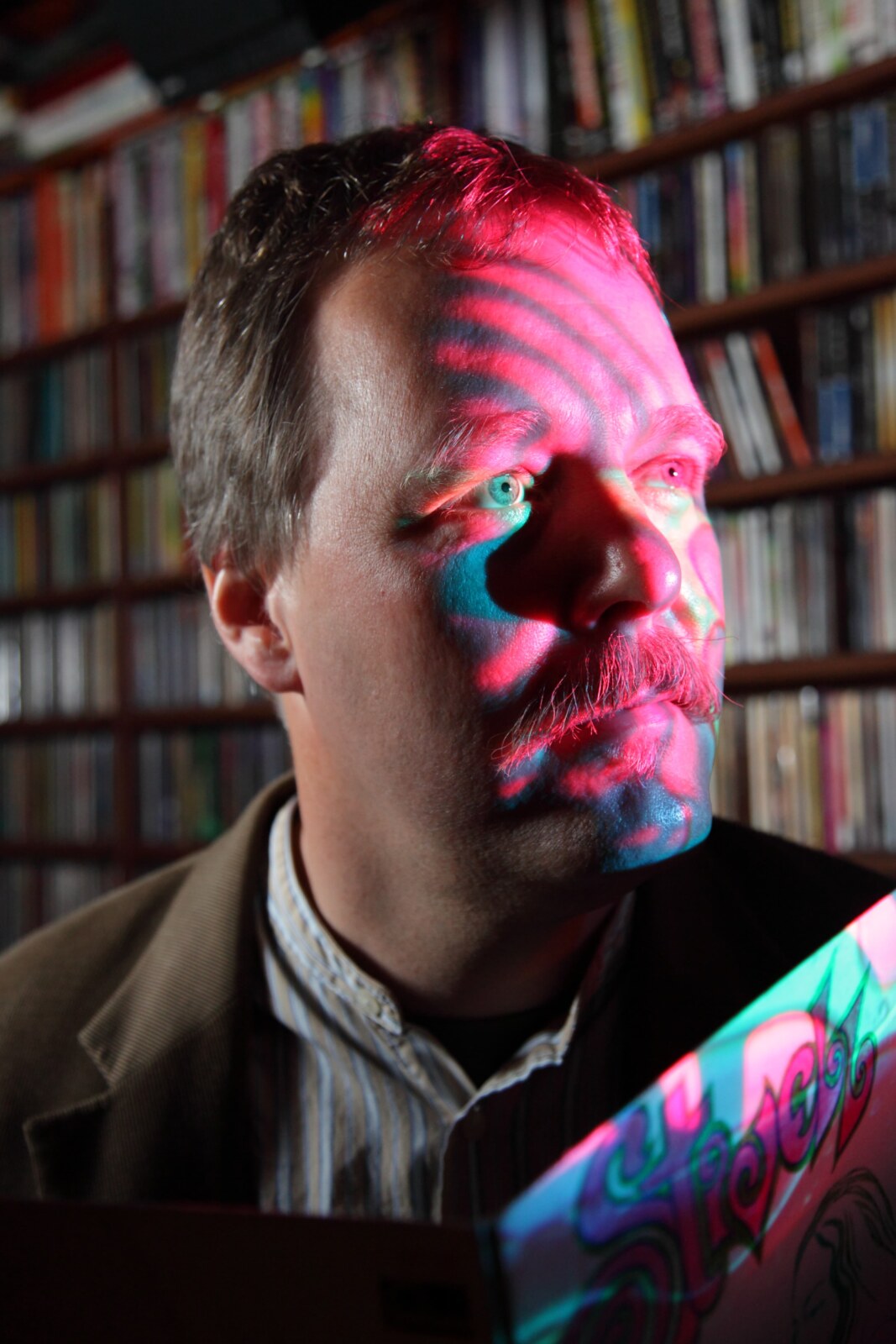
In the 1980s success that could be measured in financial terms was King. Money was celebrated at every level of society. Unlike the music of the ‘60s and 70’s the majority of the mainstream music – in the 1980s – seemed bereft of spiritual values or any kind of human dimension. I recall a novelty record called ‘Loadsamoney’ that was a hit for comedian Harry Enfield in 1988 which not only lampooned societie’s obsession with wealth but also the bland, brainless pop music of the time (see here). I’m not against money and I wouldn’t describe my politics as left wing but any sensible observer of the values of the ‘80s can only reach the conclusion that an obsession with money for the sake of money is unhealthy. John Ruskin said that “there is no wealth but life” which neatly sums up my world view. Those who think wealth is all about money and nothing else have made a terrible mistake. The world is finally finding that out! With profit the primary motivation music becomes a bland faceless product sold to the lowest common denominator. Purely commercial music has always been present but in the 1980s its influence became increasingly dominant. The 1980s was the dawn of the prefabricated X Factor/Pop Idol music that now controls the music industry at the expense of any kind of artistic vision. Creative artistic music – that has something to say – has been relegated to the independent record label. I’m not saying all music has to have a message but if I’d rather get down to the MC5 than Spandau Ballet, Five Star or Rick Astley. Iggy Pop summed it up brilliantly when he said that fruit drinks that contain only 10% juice are a bit like modern music in that it contains only 10% music. The UK 1980s underground was a reaction to these negative and dehumanising commercial forces. A friend of mine when asked what he did in the 1980s always says “The ‘60s” and that’s pretty much how I feel about it. It was a magical time if you knew where to look.
In the 1980s you began writing and editing a music magazine called Freakbeat. How did this come about? What were some of your favourite pieces that you wrote?
I first wrote a music column for a magazine called Encyclopaedia Psychedelica which was a brilliant, crazy, day dreaming trickster of a publication started by a guy called Fraser Clark, who had been involved in the ‘60s counterculture (he later went on to become well known in the rave scene). Ivor Trueman started Freakbeat, a garage psych fanzine in 1985 with Hugh Dellar of The Beatpack and I encountered it first as a reader then as a contributor and finally in 1987 as an editor after Hugh stepped aside. The magazine was printed in garish colours and we added 3D effects (visible with the free 3D glasses that came with each issue). People used to complain that they couldn’t read it, but that was part of the fun. There were eight issues in all between 1985 and 1993. I look back at some of it now and cringe at the fresh-faced naivety of the writing style but I enjoyed interviewing many of the bands that I had discovered during that period such as Ozric Tentacles, Mandragora and The Magic Mushroom Band. I interviewed The Bevis Frond (Nick Saloman) very early on, pretty much before anyone else did as well as The Dukes of Stratosphear, The Steppes – who I ended up managing and becoming great friends with – and Plasticland the wonderful American psychedelic band. I conducted one of the last interviews with Noel Redding – which is knocking around on the internet somewhere. I look back at Freakbeat now and can see how my record collection and musical knowledge grew as I discovered – and wrote about – all these bands. Not only did Ivor and I have to write the text for the magazine but Ivor would have to put together a second issue of psychedelic artwork that was laid over the top of the text, in a different colour. This was in the pre-digital so it all had to be done manually. Ivor became very good at it and later did all the design work for the Delerium label. The magazine would never have looked as good as it did without his skill and I always thought he‘d missed his vocation. We also had artists from all over the world sending us amazing psychedelic artwork – for free. Of note was Dan Abbott who did a few covers for us. A brilliant illustrator, a good friend and a man with impeccable musical taste he later went on to design Kula Shakers artwork and assisted Storm Thorgerson (Hipgnosis/Pink Floyd) He now has a flourishing career, in design. You can see his Psychedelic Paddington Bear artwork from the cover of Freakbeat 5 in the book that accompanies Rhino’s Children of Nuggets Box set. Rhino forgot to credit it.
In 1991 you opened a mail order music business and helped pioneer online music retail soon thereafter. Tell us, if you would, how The Freak Emporium was born and describe its evolution.
Freakbeat would cover all kinds of strange records but many of them were hard to find or poorly distributed. In 1991 after receiving a number of letters, from Freakbeat readers frustrated at not being able to find the recordings we were raving about, I decided to buy some stock of these vinyl albums, CDs cassettes and singles and sell them via the magazine, by mail order. This gradually grew until it became such a good source of income that in 1993 I gave my day job in export and went full time. At the same time the Delerium label had started and eventually it ballooned into a fairly large operation. We went on the internet in the mid ‘90’s long before anyone else and it just grew from there. In all we ran for over 16 years and ended up selling every collectible genre of music imaginable, from folk through electronic, to hard rock and way beyond. We were well known for selling music from non-English speaking countries long before anyone else was doing it. For instance we were selling Tropicalia and bands like Mutantes years before many in the UK knew who they were. I used to import their records directly from Brazil and we could sell them just by raving about them in our catalogue and on the website. 60’s and 70’s Argentinean Scandinavian and Mexican Rock are all favourites of mine. We were selling vast amounts of Krautrock after Julian Cope published his book Kratrocksampler. Often we were ahead of the curve and seen as trend setters. I later found out that some well known DJs musicians and journalists would buy from us regularly. With such a massive selection of music coming through our warehouse and crossing my desk my musical tastes evolved as well. I now listen to pretty much everything if it’s good. The days of just listening to psychedelic rock music are long gone. I think it’s very important to be musically educated and receptive to everything. I get annoyed by those with narrow musical tastes. I mean it’s like not knowing the full depth and nuances of a language. How can you hold a full conversation if you don’t have a good vocabulary?
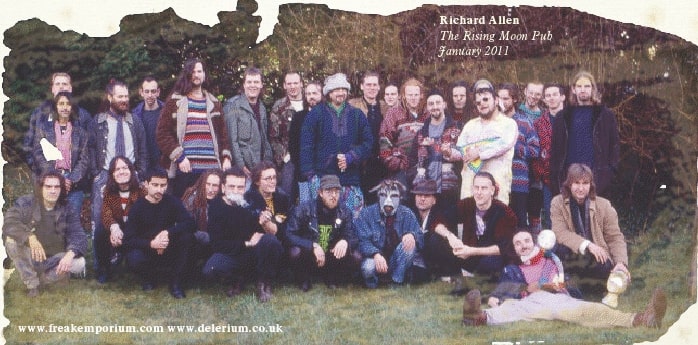
Over the years you owned several music labels. What prompted these endeavours? What labels and bands were involved and is it true that you also served as public relations and A&R director for these labels?
Freakbeat used to give away free flexi discs with each issue of the magazine from issue 4 onwards. Ivor and I started collecting music from bands we liked to issue on these discs but we realised that we’d have to put out 15 issues to catch up with the music we had amassed. That was never going to happen because each issue of Freakbeat took so long to put together, particularly because it was so labour intensive. After a suggestion from Greg Shaw, the renowned US Rock journalist and Bomp Records mogul who had become a fan of Freakbeat, we decided to issue a compilation album called Psychedelic Psauna to release all this stuff. It was released in 1991 in a mind-blowing Dan Abbott sleeve. To our amazement it rapidly sold 6000 copies, on vinyl. Not long after that by sheer luck, we got picked up by a UK distributor and things just went on from there. The next releases were Nick Riff’s Freak Element and the debut by Porcupine Tree On the Sunday of Life. I did all the press for the label, particularly for Porcupine Tree. No other label was interested in this kind of music so it was a real uphill battle particularly for Porcupine Tree a band that to start with was completely unknown, had no fan base, couldn’t perform live easily and played lengthy psychedelic guitar based progressive rock at a time when ambient trance and electronic, dance music were hip. We sold Porcupine Tree as an Ozric Tentacles type band which was a bit of a con as they were more progressive than psychedelic but it worked and they soon had a good fan base particularly in Italy. Delerium released records by many bands including Omnia Opera, The Aardvarks, Moom, Dead Flowers, Jeff Tarlton, Electric Orange, Sons of Selina and numerous other psychedelic ensembles that you can find of the recent box set compilation; Delerium – The Last Daze Of The Underground on Esoteric/Cherry Red. Once Delerium had run its course I ran two other labels including Molten Records – who issued recordings by the likes of On Trial from Denmark and UK heavy rock band Josiah – and Lightning Tree that reissued rare ‘60s and ‘70s records by Mighty Baby, Jade, Andwellas Dream, The Picadilly Line, Edwards Hand, Stallion and the Flat Earth Society.
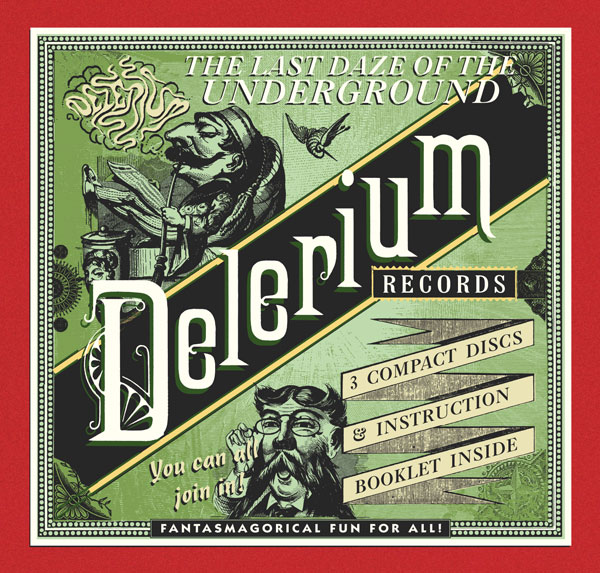
In addition you served as manager and handled public relations for some of the bands you worked with. Which were you most involved with and how on earth did you find the time to fulfil all these duties?
I managed The Steppes, Porcupine Tree and Josiah and also helped many of the Delerium bands get gigs and publicity. The amount of time I spent on PR with Porcupine Tree was crucial to their later success. It took 10 years before we got any serious interest and it was essentially a war of attrition. If you know the music is of a good quality and keep going long enough someone will eventually take notice. Music does not promote itself and it has to be hung on some PR hook in order to get exposure. With Porcupine Tree getting them onto that major label in 2003 finally broke the band to a bigger audience. They would not have made it on to a major label though, if it hadn’t been for the 10 years work prior to that point. The last thing WEA asked to see before they signed the band, in 2002, was a breakdown of sales. If they had not already sold a couple of hundred thousand records and toured Europe and The USA – with my help – I’m sure WEA would have shown no interest in a band that, commercially, was out on a limb. Looking back I don’t know how I managed to do all the press for all the Delerium bands whilst also managing Porcupine Tree (often going on tour) and running the Freak Emporium mail order. At one point we had bands coming in and out of the office; amplifiers drum kits and instruments clogging up the entrance hall, deliveries of records and studio tapes arriving. On top of that I had to constantly locate new stock for the mail order, keep the website up to date, deal with band politics and do all the kinds of tedious things businesses have to do, simply to keep going. It was crazy. I was in the office 7 days a week at one point! I’m surprised I’m still alive to be honest but I wouldn’t have missed it for the world. It was very hard work and stressful but when you do something you love – and you can see a result that people enjoy – it’s the best feeling in the world.
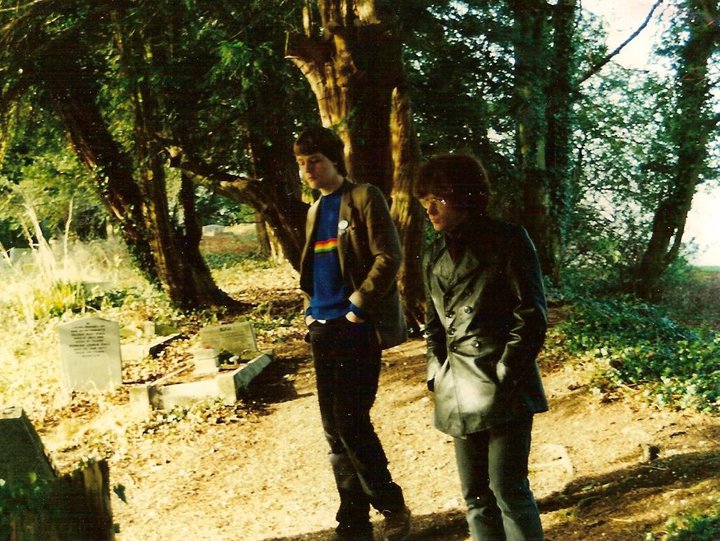
If memory serves me The Freak Emporium website was linked to the Borderline Productions website which contained online versions of Vernon Joynson’s groundbreaking books Fuzz, Acid and Flowers and Tapestry of Delights. As a result music buyers could peruse the Borderline publications and with the click of a mouse order obscure CDs from The Freak Emporium. How did this unique and innovative relationship come about?
Ivor used to edit and lay out all of the Borderline books and in return for doing that, for Vernon, we could put the books on the internet, in combination with The Freak Emporium. It was a great partnership as people could read about a band and then buy their records from us. It also resulted in many ‘60s bands contacting Vernon through the site and adding to their entries. When Ivor decided to leave the business he didn’t want the books online as he wanted to sell the books on CD ROM. He removed them from the internet and the Freak Emporium. This was a big mistake because the CD ROMs never sold and the symbiotic relationship – between the online versions of the books and the Freak Emporium mail order – ended.
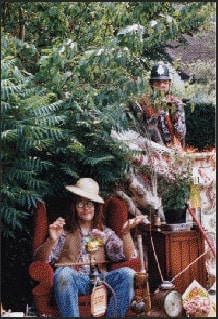
The Freak Emporium was in operation from 1991 through 2007. At its height how many labels’ products were offered and how many titles made up the websites’ inventory? How many orders were received and how many CD shipped in those 16 years? Can you give us an idea of how many nations orders were received from?
We had around 30,000 different items. We had a fully integrated website and 10 staff with our own warehouse and offices. We sold many thousands of orders all over the world but roughly half was sold in the UK. I recall we had an order from the Ambassador of Estonia. His Secretary ordered some albums by Kava Kava and Ozric Tentacles! We also sold albums to Julian Cope and Jello Biafra. We had a great customer in Denmark, a Doctor called Hans Christian Anderson. We thought his first order was a joke due to his name but he proved genuine, and he’d order all the wild psychedelic albums on our list. I met him once in London. A really nice guy in his 80s! It was a real pleasure to send music to people all over the world and hear how much they had enjoyed their purchases. People would buy stuff from us that they had never heard of before just because they knew we had good taste. I guess it was a bit like selling fine wine! Try this you may like it…..it’s a good vintage!
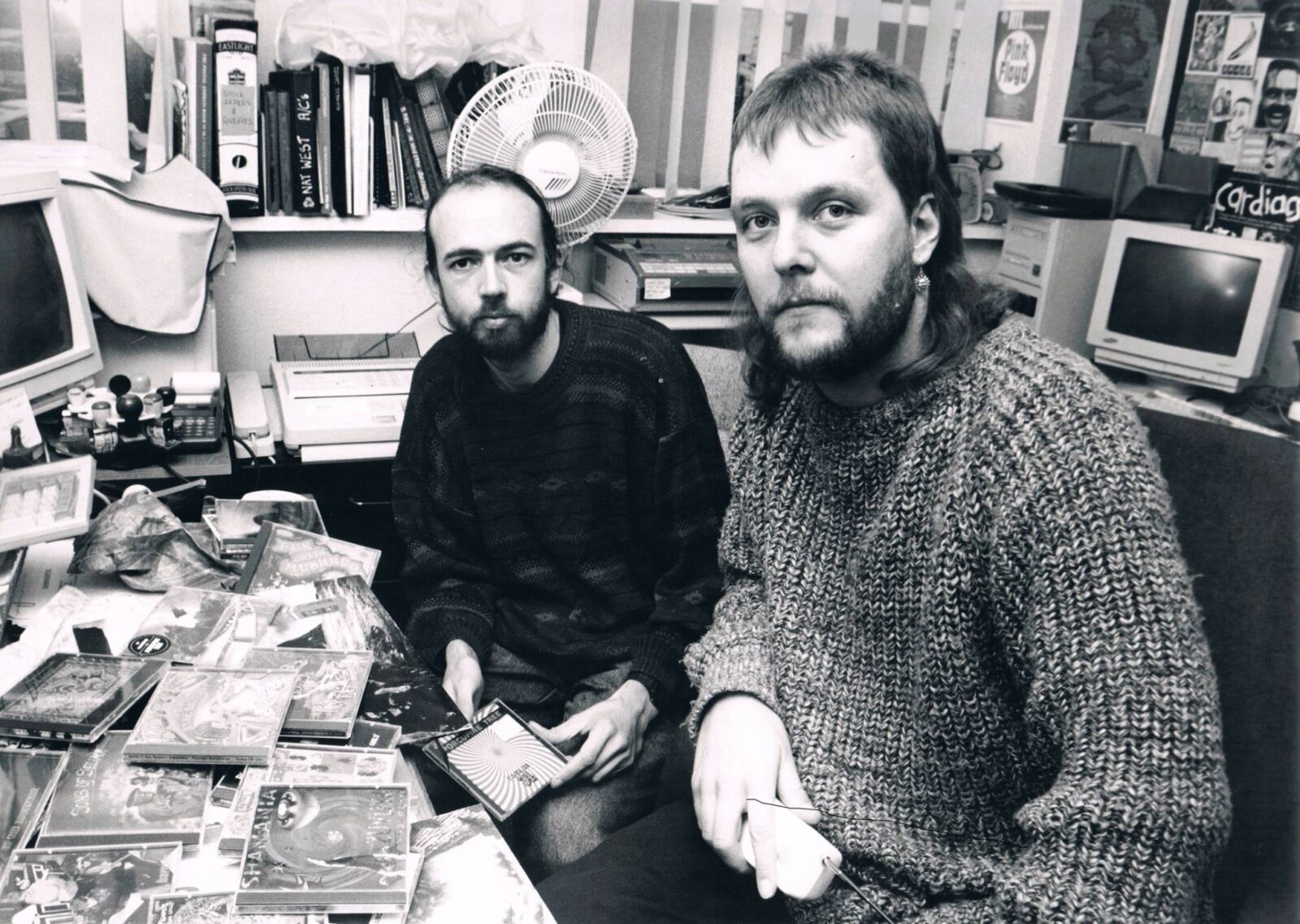
Could you explain Value Added Tax and the part the abuse of this EU tax played in the downfall of The Freak Emporium? When did you come to the realization that the business was no longer economically viable and would you describe the feelings that accompanied that realization?
Anyone in Europe will know what VAT is but it may be a mystery to those in the USA or other parts of the world. Essentially it’s a tax on the supply of goods that’s charged to the final consumer. It has to be collected by the retailer as a percentage of the price of the goods and then it’s paid to the Government by the retailer. It’s a legal obligation. If you don’t collect and pay the tax to the Government you go to jail. You can’t escape it, unless of course you find a way to fiddle the system and avoid it. That is exactly what has happened in Europe. An obscure relief from VAT known as Low Value Consignment Relief is granted to goods that enter the EU below a certain value. Some bright spark worked out that if you sent goods to a retail operation outside the EU that then sold those goods back in by mail order then you could retail goods in the EU free of VAT. That’s a big deal because VAT in the UK is 20% so the 20% advantage you gain from not having to charge VAT is enormous.
In 1998 a company called Play.com started an operation that did exactly this. They were based in Jersey, one of The Channel Islands which are outside the EU. It didn’t affect us to start with as they only sold mainstream music and DVDs but gradually between 2001 and 2006 this whole VAT avoidance industry grew up in the Islands until every major music retailer was based in The Channel Islands avoiding VAT. They were supplied by every UK music distributor. It didn’t take a genius to work out that this was not only going to wipe out UK record shops who were already suffering because of the internet but UK internet mail order operations like The Freak Emporium were also going to suffer. I didn’t see why we should be forced to relocate offshore just because of some stupid tax scam but in any event even if I was willing to relocate we were specialist and the high cost of ending the lease on my office and setting up in the Channel Islands was prohibitive. In the end the UK Government, in their wisdom, not only took no action to end this dodge but allowed the Channel Islands to exclude any UK retailers that might want to move there. None of this was anything to do with fair competition, helping the consumer or sticking it to the man. It was just plain cheating by business people who want to make money at the expense of hardworking ordinary businesses on the UK mainland who stick to the rules. The problem is that customers do not understand the fact you have to charge VAT when your competitors do not. All they know is you are more expensive. I recall a customer saying to us “I really want to by from you but I can get this stuff cheaper from Play.com”. Explaining the vagaries of the EU VAT system to a customer is not going to help you get a sale. It was death by a thousand cuts as we gradually lost all our customers to retailers that were only cheaper because they were avoiding VAT. To add insult to injury they were even buying my own Delerium and Lighting Tree releases from our distributor: shipping them out to Jersey and selling them in back – VAT free – undercutting our mail order and our UK wholesale customers! You couldn’t make it up. I realised that unless I could stop this VAT scam we were doomed.
We struggled on whilst I made every effort to end the VAT scam but on December 6th 2007 I realised I had to close the Freak Emporium because it had become unviable. After selling off all the remaining stock at a loss, in a huge sale at VAT free prices, I let my remaining loyal staff go. I handed the business to a liquidator on the 7th. Everyone was gutted. It was a mixture of sadness and sheer anger at the fact we had been destroyed by a tax scam that we were powerless to end, or so I thought at the time.
What is RAVAS and how did you come to be the spokesperson for the organization? Would you elaborate on your appearances before Parliament and the repeal of the VAT laws that related to mail order sales from the Channel Islands?
I recall watching the inspirational film V for Vendetta around this time and realised that instead of just getting mad I should try and get even. There was no point wallowing in self pity. I already had a good knowledge of VAT as I had worked for 10 years in Import and Export, prior to the music industry. I had also already been involved with a Parliamentary Committee on the subject of LVCR and VAT avoidance so had picked up a taste for politics. I started campaigning in 2006 hoping that we could end the VAT avoidance arrangement before it destroyed us and in early 2007 I was pretty confident that we would get somewhere when we issued legal proceedings against the UK Government in tandem with two large chains of Record Shops called Fopp and Music Zone. We had been advised by some heavyweight QCs that the UK was in breach of European Law for allowing LVCR to be used to retail VAT free in the EU. Unfortunately Fopp and Music Zone both went bust so we were unable to get a result as they were funding the action. Then unfortunately things got so bad I had to close The Freak Emporium but before I did that I managed to initiate a complaint at the European Commission about the UKs failure to prevent the VAT abuse. I then spent the next two years, campaigning full time, before forming Retailers Against VAT Avoidance Schemes (RAVAS) after making contact with a guy called Chris Holgate in the ink cartridge industry. He was suffering the same damage with ink cartridges being sold VAT free from the Channel Islands so we started a website as a rallying point for those who were as ‘mad as hell’ and didn’t want to ‘take it anymore’ . Before I knew it I was heading a group comprised of retailers from all over the UK who sold everything from cosmetics to heath food, computer spares, plants and flowers. I had, by accident, become the expert on this particular VAT avoidance arrangement. Eventually the EU Commission found in our favour and forced the UK to close down the scam which ended on the 1st of April 2012, but not until after the Channel Islands had put up a fight. They went all the way to the High Court and so I had to get involved in those hearings, raising funds in order that RAVAS could intervene. I also helped produce witness statements. It was one of the most exciting things I have ever been involved with. 13 QCs and at least twice as many lawyers sat in court with a Judge for three days. At the end The Channel Islands were defeated by a group of small retailers with limited funds. It was a real David and Goliath battle. Our costs were minimal yet the Channel Islands spent well over a million pounds! It was really gratifying to know that, whilst not all LVCR abuse has been ended, what I achieved definitely had a positive effect on many UK businesses – particularly in the horticultural sector. To know that I had stopped others from having to go through the misery I experienced, when I lost my own business – through others VAT avoidance – is very satisfying. I also got to know Government Ministers, MPs, many respected journalists and lawyers and a Lord. I was on National TV news and regularly in the press and on the radio. It was a surreal experience. If anyone ever says that it’s not possible to fight the system and everything is loaded against the individual, all I can say is that wasn’t my experience at all. Apathy appears to be the biggest enemy where people just lie back and accept their fate. Fighting back is definitely a long slog and very hard work but it’s possible to win through. What definitely came in handy during this period was all my experience in promoting a band. I have always said if I can make a prog band trendy I can promote anything!
(You can read more about Richard’s VAT exploits on www.vatloophole.co.uk and also at here)
The major legal hearings of the 13-15 March 2012 held at the Royal Courts of Justice in London upheld the repeal of the Channel Island VAT exemptions you helped initiate. Is there any chance of The Freak Emporium returning to the market place now?
The LVCR problem has not gone way completely as there is a wider European dimension that needs dealing with which is still occupying my time. The job needs finishing and I intend to see it through. I think I then need a holiday before doing anything else…but who knows what may happen. The Freak Emporium may return in some form even if just a blog but to bring it back as a business would not be easy because the VAT abuse wiped out everything; all our years of work, our customer base and our profile on the internet and position in the market.
You are credited as “Project Coordinator and Third Ear” on the monumental Thirteenth Floor Elevators box sets Sign of the 3 Eyed Men and Music of the Spheres. What was your involvement in these projects and how did you feel being involved with such an historic band?
In terms of Psychedelic music the Elevators are up there with the 10 Commandments. They are the core scripture. They did it first and they did it best. Easter Everywhere has been on my top ten albums list since I first started buying albums. It’s pure genius that goes beyond mere pop music, reaching into something other-worldly, sacred even.
How the box sets came about is a great example of synchronicity. Porcupine Tree signed to Snapper Records in 1997 and I knew that Snapper was the licensee for Charly who owned the Elevators catalogue. Fans of the band will know how badly the catalogue had been neglected and how many crappy, badly, inaccurate and poor quality releases had been circulating for years. Every time I visited Snapper I’d ask about the whereabouts of the International Artists master tapes and try and convince them it was worth properly mastering the catalogue and doing it justice. The rumour was that all the tapes were lost in a fire and Charly had been using shoddy third generation sourced vinyl dubs for years. The sales guy at Snapper wouldn’t have it and insisted that the catalogue had been well packaged and milked to death and could not be revived. That didn’t put me off. I think I was seen as a bit of a crazed obsessive! Then around 2007 I got talking with one of the guys at Snapper again and he started to show some interest so I emailed Patrick ‘The Lama’ Lundborg (Acid Archives) who had published the most definitive discography of the band. I asked him if he knew where any master tapes might be as I was helping put together the ultimate Elevators set. Within half an hour I had an email back from a guy called Paul Drummond who said “I’m doing that …and I’m working with the band and publishing a book on them… who are you? “ Paul is the world expert on the band and authored the definitive Elevators book Eye Mind. He is my kind of record nut. He virtually lived in Texas for a year interviewing every remaining member of the band and collecting every piece of memorabilia he could find including master tapes, unreleased material and even photos from the Austin Police Department that were taken whilst the band were under surveillance in 1967. Once Paul and I got talking we realised we were on the same mission. Paul knew the band and had all the goodies but he had no way of getting Charly/Snapper to work with him and so we hatched a cunning plan. It involved waving master tapes and box loads of memorabilia in front of Charly/Snapper and telling them that they wouldn’t get any access to this stuff unless we had complete control over a box set. They eventually agreed and that’s how it all came about. Other than my role in getting Snapper interested and looking over Paul’s ideas for packaging and design my only other involvement was the mastering (hence the ‘third ear’). Paul and I spent a few days in the studio ensuring the master tapes, records and acetates were transferred correctly and cleaned up to ensure the best possible sound. I can confidently say that the box set discs sound better than original pressings of Elevators albums and we played both side by side to make sure. That box set is superior to anything ever released by the band. Of course Paul’s contribution went way beyond mine and I was humbled to even get a credit but was ultimately thrilled to have anything to do with this legendary and groundbreaking group. I also managed to get box number 13 which opens up a portal into another dimension.
You are a noted record collector. How large is your collection? Can you name some of your favourites and what is currently on the playlist at the Allen household?
Over the last 25 years my taste in music has grown to dangerous proportions. I have thousands of LPs and CDs many of which are now rare. Having run a retail operation I have heard so much music that it’s impossible to choose favourites. There are so many obscurities I could list but at the moment I’m listening to a long term favourite, The Beach Boys, having seen them at their very last 50th Anniversary show in Wembley the other week. They were incredible even in their 70s and their records, particularly the late 1960s recordings are timeless masterpieces. UK artist Nigel Mazlyn Jones is an obscure favourite and his Ship to Shore is one of the best singer songwriter folk albums of the UK 70s. Similarly Marianne Segal and Jade’s sole album Fly On Strangewings is an all time favourite of mine. They were a UK folk Rock band that made this one beautiful album in 1970 which I reissued and returned to its rightful place at the pinnacle of UK 70s folk rock. I also got to know Marianne who is an immensely underappreciated talent. Other favourites include the mind bending Dutch ‘60s band Group 1850, the eternal Gong, Sandy Denny and Fairport and The Grateful Dead who I have collected since the day I first saw them in 1981. That band wasn’t just a band they were a family. Best current band for me has to be the UK’s Wolf People.
What is your favourite release and why?
One of the last reissue projects I was involved with on Lightning Tree was a compilation of all the original songs of the 1920s and 1930s that were covered by the Bonzo Dog Doo-Dah band. I had so much fun putting that together that it’s easily my favourite release. I bought an old 1914 gramophone and restored it and then went looking for every shellac 78 jazz and British Dance band recording I could find. It took me three years during which I had to enter the strange world of 78s collecting. Eventually, after researching the music and spending a fortune getting the best possible sound quality Songs The Bonzo Dog Band Taught Us was issued with a Dan Abbott sleeve. As a direct result of that CD I got to meet my heroes the Bonzo Dog Band including Legs Larry Smith and Roger Ruskin Spear. At an after show reunion party Neil Innes came up to me and shook my hand for saving all these old songs, from oblivion. He even plugged the CD in the reissues of the Bonzo Dog Band’s catalogue on EMI and shortly after Roger Ruskin Spear told me that the album had been a major inspiration for the formation of Three Bonzos and a Piano. I was flabbergasted to say the least. As Viv said “I’ve listened to it every day since and it’s never needed repairing”.
“The music industry is a selfish environment.”
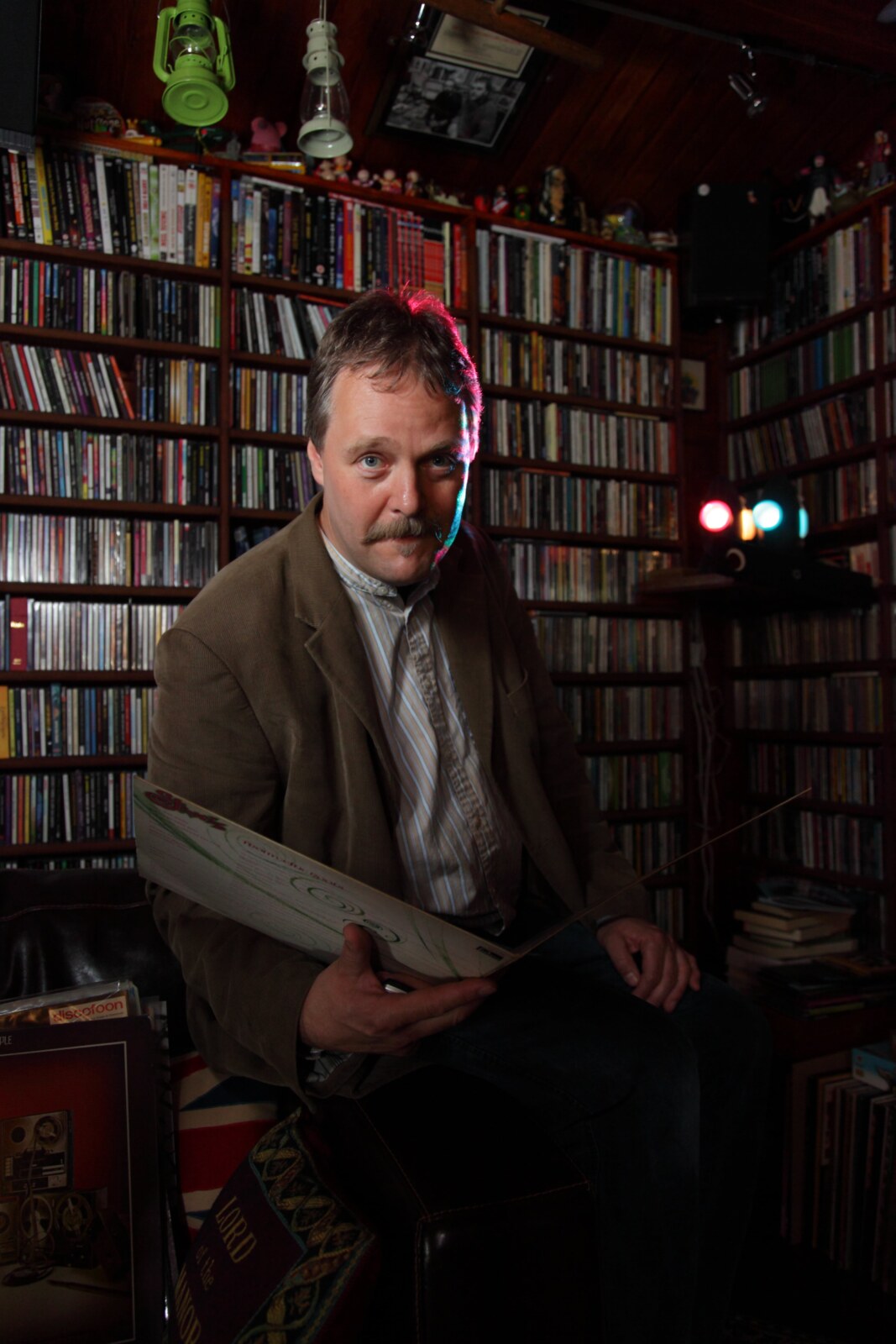
One last question: What is next on the agenda for Richard Allen?
The music industry is a selfish environment. It needs to be in order to promote its wares. It thrives on intense obsession and dedication at every level. Although my ‘career’ in the business has been stressful and at times went in directions which made no sense – until later – I’m glad that I came through my adventures still liking music and not bitter and twisted. I’ve seen that happen to others and it’s not fun. At 49 years old, with a young family, my obsession is looking after them. It’s time to move on. If I can listen to my record collection, pick up the odd reissue and new recording and keep writing for the brilliant Shindig! Magazine, purely for fun, then I’ll be happy. You are never too old to rock ‘n’ roll but I’m certainly too old to promote it.
Thank you so much for your time Richard.
Thanks for listening. It’s been therapeutic!
– Kevin Rathert
The record shop, the taxman and the missing billions




1Richard, I just read your interview again. I wanted to take some time to put it in perspective. I believe it is one of the best interviews I have ever read. You are so very articulate and so multidimensional. Thank you once again for all your time, thought and efforts in this wonderful piece of musical history.
All the best,
Kevin
I was one of those music fans hooked in on the Freak Emporium psych ride. I spent my money, bought the t-shirts, and appeared on one amazing issue that requested readers pictures!
Great guys and a great loss for true music fans.
I can never give enough respect to these lads and the work they put in.
Much respect.